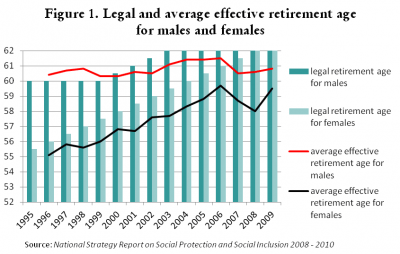Since regaining independence some twenty years ago Latvia, a small, open economy has been tormented by three economic crises: first one resulting from the economic transition (institutional change from centrally planned to free market economy), second, in 1998, being transmitted from Russia, and the last one being part of the recent global recession.
Despite these circumstances, Latvia has successfully conducted reforms aimed at elicitation of the labour force (i.e. increasing the labour force participation rate amongst near-retirement age groups), reducing the unemployment and rising the effective retirement age amongst the Latvians. Efficiency of these reforms can be explained by the governmental persistency in their enforcement as well as the popular support for the government of the prime mister, Valdis Dombrovskis (who himself is the central figure behind those policies).
One of the main challenges facing the Latvian economy has been ageing of the population, although its effect on the public finances is limited by the recent reforms of the national pension system.
Latvia is one of the few countries which increase the legal minimal retirement age at the pace of six months p.a. for both genders. In comparison, in Poland this pace is twice smaller.
Incidence of the cohort effects (i.e. some shared characteristics of the population resulting from a common temporal experience) in conjunction with the economic growth inducing increases in demand for labour in all age groups, brought about outstanding results: rise in employment amongst women and men in near-retirement age by respectively 30 and 18.6 percentage points.
As a result, labour force participation rate amongst near-retirement age individuals increased by 30.5 and 16.3 percentage points for females and males respectively. Employment in the group of individuals aged 64 or above has also experienced an increase.
Formation of the government by Valdis Dombrovskis resulted in stabilisation of the internal situation in Latvia. Despite the fact that the ex-finance minister introduced reforms resulting in severe reductions of governmental spending, the Latvians granted him trust which he managed to confirm during the 2010 parliamentary elections.
Even though Mr Dombrovskis’ party failed to win the 2011 parliamentary elections (it fared third, closely after the winner of the second place, a party sharing similar political stance), he was granted the mission of forming the new government. The Latvians remember that he is to be thanked for rescuing the country’s economy.



















No comments
Be the first one to leave a comment.